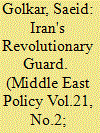|
|
|
Sort Order |
|
|
|
Items / Page
|
|
|
|
|
|
|
| Srl | Item |
| 1 |
ID:
154690


|
|
|
|
|
| Summary/Abstract |
The Clerical Basij Militia is an institution created and used by the Islamic Republic of Iran (IRI) to exert strict control over seminary students (tollab), silence dissident clergy, and nullify threats from seminarian scholars. The expansion of Clerical Basij in seminaries has led to regime control over clerics and the securitization of seminary schools. It has also resulted in the emergence of a new group among the clergy with a hybrid identity: part clergy, part security. The expansion and strengthening of this group could lead to the transformation of the Islamic Republic into a “theological security state.”
|
|
|
|
|
|
|
|
|
|
|
|
|
|
|
|
| 2 |
ID:
167913


|
|
|
|
|
| Summary/Abstract |
In 2018, after the suppression of the Green Movement following the disputed presidential election of 2009, Iran witnessed another wave of uprisings. Despite temporarily disrupting the life of the state, Iran's 2018 protests were not successful in undermining the Islamic Republic. In the absence of any foreseeable fundamental change, observers of Iran agree on two premises regarding the future. First, reform from above and among the political elites is the safest, most stable way for the Islamic Republic to make the transition into a more normal and democratic regime. Second, this reform from above is impossible without the support of Supreme Leader Ayatollah Ali Khamenei, the strongest man in Iran's political structure.
|
|
|
|
|
|
|
|
|
|
|
|
|
|
|
|
| 3 |
ID:
133623


|
|
|
|
|
| Publication |
2014.
|
| Summary/Abstract |
During the past three decades, numerous Western media sources have portrayed Iranians as opposed to the United States, epitomized by a small group shouting "death to America." However, many Westerners who have traveled to Iran have seen a completely different picture, often finding that many Iranians have more positive attitudes.1 Many American visitors have described Iranians as the most pro-American people in the Middle East.2 Deep frustration with the Islamic Republic and mistrust of the clerical establishment's propaganda have made Iranians "avid fans of America: its culture, films, food, music, it's open, free-wheeling society
|
|
|
|
|
|
|
|
|
|
|
|
|
|
|
|
| 4 |
ID:
115267


|
|
|
|
|
| Publication |
2012.
|
| Summary/Abstract |
The Basij, a massive Iranian paramilitary organization, has played a crucial role in the country's politics, economy, and society at large for the past two decades. While the Basij's increased formal involvement in the Iranian economy was initially meant to guarantee the welfare of its personnel, the Basij has since extended its influence to every sector of the economy, from construction and real estate to the stock market. The expansion of its economic activity has enhanced the Basij's control over society and its influence on domestic politics. This article investigates the history, justifications, and consequences of Basij engagement in business and the economy in postrevolutionary Iran.
|
|
|
|
|
|
|
|
|
|
|
|
|
|
|
|
| 5 |
ID:
122165


|
|
|
|
|
| Publication |
2013.
|
| Summary/Abstract |
The purpose of this article is to analyze the evolution of the Professors' Basij Organization (PBO) and its role in maintaining state control over Iranian universities. This study will examine why and how the PBO became involved in politics in general and in controlling Iranian universities in particular, and will discuss the implications of the expansion of the PBO at Iranian universities. While the PBO has been helping the Islamic regime control Iranian universities through different methods, including repressing the student movement and training a new cadre for the Islamic regime, it has transformed into one of the most influential organizations in Iran's political structure, especially after hardliners assumed power in 2005.
|
|
|
|
|
|
|
|
|
|
|
|
|
|
|
|
|
|
|
|
|